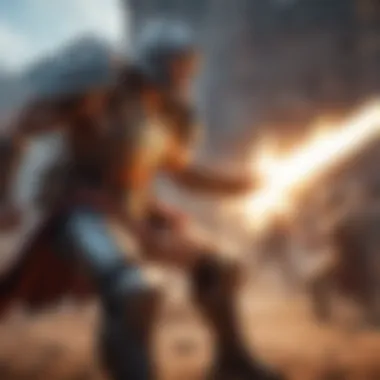Top Clash of Clans Alternatives to Explore Today


Intro
In the gaming realm, Clash of Clans has carved quite a niche for itself. As many gamers clasp their phones with glee each time they strategize their next base upgrade or resource raid, it’s understandable that some folks might be itching for something different. The concept of base building combined with resource management isn’t exclusively owned by Clash of Clans. In fact, a treasure trove of alternatives exists, just waiting to be explored.
Now, this isn’t mere child’s play; there’s a world of intricacies that can captivate even the most seasoned strategist. This article aims to shine a light on several engaging games that echo the core elements of Clash of Clans, yet offer their distinct flavor. From unique gameplay mechanics to eye-catching graphics and soundscapes, these titles promise a refreshing gaming experience.
One thing’s for certain, diving into these alternatives could very well satisfy that itch for strategizing and managing resources, allowing players to flex their tactical muscles in new and exciting environments. You will see discussion surrounding each game's strengths, weaknesses, and captivating features.
So, without further ado, let's dive into the Game Reviews!
Prelims to Strategy Games
The world of mobile gaming has exploded over the past decade, with strategy games like Clash of Clans capturing the hearts of millions of players. Understanding strategy games is crucial as they not only stimulate the brain but also foster skills like planning, resource management, and critical thinking. In this aspect, strategy games serve as a platform where players can build intricate structures, develop their armies, and engage in multiplayer battles that offer a competitive edge.
One main feature of such games is their ability to connect players through shared objectives and rivalries. Gamers often enter global tournaments or guilds, reinforcing that sense of community. The social element enhances the gaming experience, making it not just about winning or losing, but about forming bonds and sharing strategies with others. This camaraderie adds a rich layer to gameplay, often making players return for more.
When we look at the development of mobile strategy games, it’s about understanding how these games have evolved over time to meet player demands and technology advancements. Enjoying a strategy game goes beyond mere entertainment; it demands a certain level of dedication that can lead to a strong sense of accomplishment. Players who invest time in these games often find that their efforts bear fruit, whether through skill improvement or social recognition.
Here are some key points to consider about strategy games:
- Cognitive Development: Strategic gameplay can enhance problem-solving skills.
- Community Engagement: Participation in an active player community can boost motivation and enjoyment.
- Dynamic Challenges: Regular updates and new content keep the gameplay fresh and engaging.
In summary, this chapter serves as the gateway to understanding the rich layers and dynamics that make strategy games irresistible. It's not just about Clash of Clans, but an expansive world filled with various options waiting for exploration.
Analyzing Clash of Clans Gameplay
Analyzing Clash of Clans gameplay is crucial for understanding what makes it so captivating and, consequently, what alternatives might offer similar or enhanced experiences. This section will dig into the core mechanics and features that keep millions engaged. From resource management to strategic planning, these components are fundamental to the enjoyment and success players experience in the game. By breaking it down into bite-size segments, we can illuminate the attributes that gamers often seek in similar games.
Core Mechanics and Features
At its core, Clash of Clans thrives on a compelling combination of strategy, resource management, and combat. Players build their bases, gather resources, and train troops—all while fending off attacks from other players. This intricate dance of offense and defense creates a gameplay loop that many find addictive.
- Base Building: Players craft their own villages with defensive structures and resource-generating buildings. The unique layouts make every player's base a reflection of their strategy, offering a sense of personalization.
- Resource Management: Game elements like gold, elixir, and dark elixir force players to balance their offensive needs with upgrading their villages. It teaches the importance of prioritizing resource allocation, a skill that translates well to many life scenarios.
- Upgrade Systems: Each unit and building possesses a distinct upgrade path, enticing players to invest more time and effort into their strategies. This niche system captivates gamers who enjoy planning their long-term progression.
With these mechanics, Clash of Clans captures a delicate balance that many alternatives aspire to replicate. The smooth integration of strategy and resource management keeps players returning for more.
Community and Multiplayer Elements
The community aspect of Clash of Clans adds an unshakeable depth to the experience. Multiplayer features such as clan systems encourage interaction between players, fostering a sense of belonging and teamwork. The social dynamics at play can often make or break a game's appeal.
- Clans: Together, players can form or join clans, sharing resources and strategies. Effective communication tends to establish near-unbreakable bonds among members, many of whom form friendships that extend beyond the game itself.
- Friendly Challenges and Wars: These features provide an avenue for clans to compete against each other. Not only does it boost mutual engagement, but it also enhances teamwork as players strategize together, creating memorable experiences.
- Leaderboards and Tournaments: The competitive elements keep players striving for recognition and achievement. Climbing the ranks can offer a rush that keeps players on their toes—something desirable within strategic gameplay.
Top Alternatives to Clash of Clans


In the ever-evolving landscape of mobile strategy games, finding alternatives to beloved titles like Clash of Clans is crucial. Players seek fresh experiences that still tickle their strategic fancy while allowing them to manage resources and build their bases. The appeal of these alternatives lies in their unique features that sometimes even surpass those of Clash of Clans. Exploring these options enables gamers to broaden their horizons and maybe even discover their new obsession.
Game One: Boom Beach
Unique Features and Gameplay
Boom Beach prides itself on its combination of base building and offensive strategy. Players aren't just crafting their own settlements; they're actively fighting against the villainous Blackguard. The focal point lies in its open-world format, which sets it apart. Instead of guarding a village, Boom Beach stretches players into exploration, encouraging them to choose battle strategies that best suit their play style.
The game's "attack bases" mechanic allows players to attack enemy strongholds that offer various resources, adding a layer of depth rarely seen in similar games. The opening of new territories not only enhances resource management but also makes every decision more critical, thus heightening the stakes for strategic planning.
Comparative Analysis with Clash of Clans
When stacked against Clash of Clans, Boom Beach shines in its real-time combat and the focus on tactical attacks rather than merely upgrading buildings. Clash centers itself more around passive defense; meanwhile, Boom Beach demands active engagement through attacks, making away for a dynamic experience.
However, some might find the transition from base management to combat could be too jarring or demanding, depending on personal gaming tastes. The action-oriented gameplay can be exhilarating for some, but disorienting for players who prefer a stronghold strategy.
Game Two: Castle Clash
Hero-based Mechanics
Castle Clash operates on a unique premise that emboldens heroes as pivotal players within the strategy. With a variety of character classes, including warriors, mages, and others, players choose heroes that fit their own play style, adding a layer of personalization. This aspect allows for deeper engagement, as upgrading heroes becomes part of mastering the game.
The battlefields showcase multiple heroes fighting in an arena, which contrasts with traditional design strategies focused solely on defensive setups. Chaos often reigns, making for a chaotic yet enjoyable experience. Furthermore, this setup appeals to gamers because it caters to both combat and strategy lovers.
Strategic Depth and Challenges
Beyond just fighting, Castle Clash has an arsenal of strategic challenges. Players must plan their hero compositions and tackle diverse challenges like dungeons and quests. This nuanced strategy fosters a greater understanding of base-building and army compositions.
Yet, for all its allure, newcomers may feel overwhelmed by the sheer number of heroes, abilities, and equipment. Thus, while appealing in many aspects, it can present a steep learning curve for the uninitiated.
Game Three: Tribal Wars
Real-time Strategy Elements
Tribal Wars can be seen as a classic in the community of mobile strategists. Its real-time mechanics allow players to experience the excitement of strategy firsthand, where every decision counts in the heat of battle. Players manage a village while attacking and defending against others, all occurring simultaneously.
This immediate action heightens tension, as your counterparts can attack at any second, pushing players into a constant state of alertness. For those craving a live-action atmosphere in their strategy games, Tribal Wars embodies this with its immersive gameplay mechanics.
Community Engagement and Alliances
The game also thrives on the strong community and alliance system that allows players to form partnerships and strategies together. This collaborative aspect proves to be a game-changer for player engagement. In-game communication between tribe members is vital for survival and success.
However, managing these relationships may require more time than newcomers expect, possibly becoming burdensome and leading some players to feel alienated if not actively involved. Thus, this community aspect is both an enriching experience and a potential hurdle for casual gamers.
Game Four: Clash of Clans Alternatives


Comparative Features with Clash
While the title suggests comparisons to Clash of Clans, it opens a vibrant spectrum of alternatives that carry familiar gameplay without the direct clone heavy weighting. Games like Lords Mobile harness similar tactics in a more expansive world, including hero systems intertwined with base mechanics. This juxtaposition offers players engaging content without losing sight of beloved features from the classic game.
Critics highlight these alternatives for their enriched visuals and robust engagement strategies, and many players experience familiarity while simultaneously uncovering something new.
Player Base and Growth Metrics
The development of these alternatives often reflects a steady rise in player engagement, often requiring closer community bonds as they navigate through cooperative features – something quite reminiscent of Clash of Clans. Therefore, these alternatives give players a rich experience as they explore the nuances of different strategy games while still basking in the glow of Clash’s notoriety.
Game Five: The Settlers
Development Mechanics
Unlike others listed, The Settlers casts a wider net into the realm of city-building within strategy, providing a more profound developmental experience. Players focus heavily on managing resources, creating supply chains, and controlling the economy on a broader scale. In this regard, it earns its place as a worthy alternative to Clash of Clans.
The unique trade-system mechanics set The Settlers apart, drawing in players who love to micromanage their settlements to create the most efficient resource distribution possible.
Resource Management Strategies
The Settlers’ emphasis on resource control means that players have additional layers of strategy to master. Players can fine-tune their approaches and work on their economic strategies at meticulous levels, allowing for satisfying victories that come from planning and foresight.
However, newer players may find the resource mechanics overwhelming, where many details can lead to confusion. This comprehensive depth is not for the faint-hearted, but for those seeking an engaging, methodical approach to strategy gaming, it's a treasure trove.
Comparative Analysis of Alternatives
In the realm of mobile strategy games, understanding the alternatives to Clash of Clans can help gamers pinpoint their preferences and broaden their horizons. The comparative analysis of these alternatives isn’t just about finding games that share gameplay elements; it’s about grasping the nuances that make each title distinct. This section aims to explore various facets of these alternatives to shed light on their similarities and innovative features while also assessing how they stack up against Clash of Clans.
Similarities with Clash of Clans
When discussing games akin to Clash of Clans, pinpointing the similarities can provide valuable insight into what makes these alternatives appealing. Here are some key areas where these games find common ground:
- Resource Management: Much like Clash of Clans, many alternatives, such as Boom Beach and Castle Clash, incorporate the fundamental mechanics of managing resources—gold, elixir, and other essentials to develop your base. This requirement pushes players to strategize effectively, balancing collecting and spending resources wisely.
- Base Building: Players in these games invest in creating their bases, whether to defend against rival attacks or showcase their strategic prowess. Building and upgrading structures is a significant part of the game loop, mirroring the deep customization found in Clash of Clans.
- Attack Strategies: Attacking opponents parallels Clash of Clans mechanics, laying out the necessity to select troops, devise offensive strategies, and execute plans against enemy bases. The tactical decision-making during attacks resembles the planning involved in Clash of Clans raids.
By highlighting these similarities, one can appreciate how these alternatives capitalize on familiar gameplay mechanics while still offering something new to the table.
Distinct Features and Innovations
While parallels exist, the real draw of exploring alternatives lies in their unique attributes. Below are distinct features that separate these games from the Clash of Clans mold:
- Hero-based Mechanics in Castle Clash: Unlike Clash of Clans, Castle Clash focuses heavily on heroes that possess special abilities, allowing players to build their strategies around these characters. Each hero brings a different flavor to battle, adding a layer of complexity to gameplay.
- Real-time Battles in Tribal Wars: Tribal Wars takes a different approach by incorporating real-time battles, where players must make quick decisions and adapt on the fly. This level of immediacy contrasts with the turn-based attack strategies found in Clash of Clans.
- Complex Resource Management in The Settlers: In The Settlers, resource management becomes more intricate, involving trade and diplomacy alongside military conflict. Players must navigate not just their base development but also interactions with other players, offering a richer gameplay experience than what’s typically seen in Clash of Clans.
Factors to Consider When Choosing a Game


When gamers eye alternatives to Clash of Clans, it's crucial to examine several key factors that can significantly impact their gaming experience. Choosing the right strategy game isn't just about the graphics or hype; it delves deeper into gameplay mechanics, community interactions, and personal preferences.
Gameplay Mechanics and Style
First and foremost, one must consider the gameplay mechanics and style that resonate with one's gaming habits. Each game has its distinct rhythm of play. For example, while Clash of Clans centers on base-building and resource management, other games like Boom Beach might emphasize a more aggressive combat style.
- Pacing: How fast-paced do you want your game to be? Typically, games with quicker pacing offer heightened intensity but may lack depth in strategy. In contrast, a slower pace allows for careful planning, essential for effective resource management.
- Strategy Depth: Different games can either reward strategic planning or encourage more spontaneous decisions. Players who thrive on meticulous planning might find satisfaction in games that require elaborate tactics over a longer period of time.
- Customization Options: Personalization can enhance your affinity towards a game; does it allow for unique strategies based on customized troops or defenses? Games that permit players to develop unique tactics offer a refreshing twist and keep gameplay engaging.
Evaluating these mechanics lets players align their choices with their play styles, ensuring the game offers the right mix of challenge and enjoyment.
Community and Multiplayer Dynamics
Next up, one cannot overlook the community and multiplayer dynamics, which play an essential role in the longevity and enjoyment of a game. The sense of camaraderie among players can often outweigh the game’s individual merits.
- Collaboration vs. Competition: Does the game foster teamwork or rivalry? Games with strong cooperative elements can lead to lasting friendships and enhance the gaming experience, making success feel more rewarding. Alternatively, competitive games can offer a thrilling challenge but may also create a more toxic environment.
- Supportive Communities: A welcoming community can enrich a player's experience. Platforms like Reddit often feature support groups or forums where players discuss strategies, or troubleshoot issues that they encounter.
- Updates and Developer Engagement: Active developers who frequently update their games show dedication to player needs. A responsive community, where players can feel heard and involved, creates investment in the game’s future.
The Future of Mobile Strategy Games
As the digital landscape continues to evolve, mobile strategy games hold a unique place in the hearts of gamers, offering both familiarity and innovation. The future of these games is not just about keeping pace with technology; it’s about reimagining how players engage with content. Let's delve into what this means for avid players and what they can expect in the coming years.
Emerging Trends and Technologies
One can't ignore the waves being made by emerging trends in the strategy game space. Virtual reality, augmented reality, and cloud gaming are bulldozing through traditional barriers, offering ways to immerse gamers like never before.
- Augmented Reality (AR): Games like Pokémon GO have paved the way, demonstrating how blending the real world with gameplay can enhance user experience. Imagine designing your own base in your backyard, gathering resources while walking about your neighborhood.
- Artificial Intelligence (AI): Enhanced AI can drastically alter gameplay dynamics. Games may soon feature NPCs that learn player strategies, providing a level of challenge that adjusts on the fly.
- Cross-Platform Play: Players could engage across devices seamlessly. Imagine going from your phone to your PC without losing progress—this is quickly becoming a standard, not just a novelty.
Overall, these trends hint at a future where gameplay is not just confined to a small screen but expands into our everyday lives.
Predictions for Upcoming Titles
As the landscape shifts, predictions can feel like shooting at shadows—though some stand out through the fog.
- Hybrid Models: Expect a rise in games that blend genres, combining base-building mechanics with RPG elements or even battle royale features. This hybridization can cater to diverse player preferences.
- Evolving Storylines: Narratives may become more dynamic. Instead of static content, upcoming titles could present player-driven stories—choices made in battle might ripple out to affect the game's world dramatically.
- Community-Driven Development: Platforms like Reddit have shown that player feedback can guide future updates. This trend might reach new heights, where games adapt in real-time based on community desires.
Ultimately, the evolution in mobile strategy games promises more than just better graphics; it hints at an era where player agency and immersive experiences are paramount, shaping a new generation of strategy gameplay that respects both tradition and innovation.
"The only constant is change. The games we know today will evolve into something we can’t yet imagine."
As we engage with these evolving dynamics, both developers and gamers have a role in shaping the future of this vibrant genre.
Culmination
In the realm of mobile strategy games, the journey through alternatives to Clash of Clans offers a tapestry of unique experiences and gameplay mechanics. As gamers, the selection process is not merely about picking any game; it’s about finding one that aligns with personal preferences and strategic ambitions. In this article, we explored various titles that mirror the engaging elements of Clash of Clans while delivering fresh twists and innovations.
Understanding the factors influencing game selection is crucial. Firstly, consider gameplay mechanics and style. Does the game require a defensive strategy, or is it more about offense and aggressive warfare? Each game offers different strategic depths that might appeal to varied play styles. Furthermore, community engagement plays a vital role. Some games foster alliances, allowing players to form bonds and strategize together, while others emphasize solo play.
Another significant aspect is the unique features each game presents. While some games might focus heavily on resource management, others might introduce hero mechanics or real-time strategy elements which shake up the conventional base-building approach.
"Choosing the right mobile strategy game is like finding a home; it should feel right for you personally."
As you venture into the world of mobile strategy, take the time to evaluate what aspects bring you joy—be it the thrill of tactical battles or the satisfaction of resource management.



